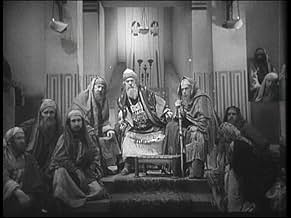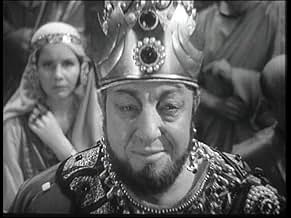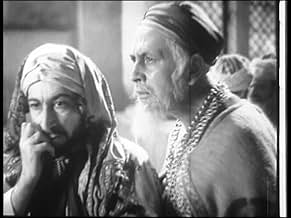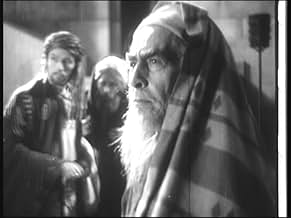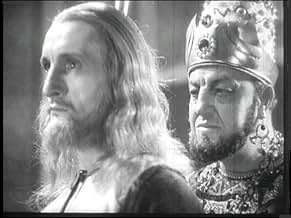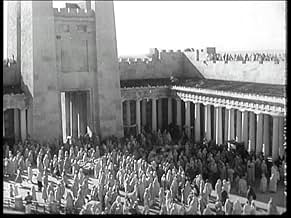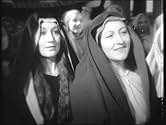Agrega una trama en tu idiomaThe final days of Jesus from the time he enters the city of Jerusalem. Viewed as a threat, it is decided that he must be captured, tried, and executed as a criminal, a plan aided and abetted... Leer todoThe final days of Jesus from the time he enters the city of Jerusalem. Viewed as a threat, it is decided that he must be captured, tried, and executed as a criminal, a plan aided and abetted by disciple Judas Iscariot.The final days of Jesus from the time he enters the city of Jerusalem. Viewed as a threat, it is decided that he must be captured, tried, and executed as a criminal, a plan aided and abetted by disciple Judas Iscariot.
- Dirección
- Guionista
- Elenco
- Premios
- 1 premio ganado en total
André Bacqué
- Anne
- (as Andre Bacque)
Hubert Prélier
- Pierre
- (as Hubert Prelier)
Edmond Van Daële
- Gerson
- (as Van Daele)
Marcel Chabrier
- Joseph d'Arimathie
- (as Chabrier)
Georges Saillard
- Un Sanhédrite
- (as Saillard)
François Viguier
- Un Sanhédrite
- (as Viguier)
Maurice Lagrenée
- Philippe
- (as Maurice Lagrenee)
- Dirección
- Guionista
- Todo el elenco y el equipo
- Producción, taquilla y más en IMDbPro
Opiniones destacadas
There are a countless movies over the Jesus's life, instead this one is applying just in his final days after the triumphal arrival in Jerusalem and his trial told under Matthew's gospel, strangely just four gospels accepted in the bible have some differents versions, each one has a little disagreement, easily understandable of course, these old testimonies were put together centuries ahead, this great french production is really fine, a little sins as the Jerusalem's architecture is based in Egyptian's large buildings otherwise is almost perfect, Robert Le Vigan as Jesus and a still young Jean Gabin as Ponce Pilatos were flawless!!!
Resume:
First watch: 2018 / How many: 1 / Source: DVD / Rating: 8.25
Resume:
First watch: 2018 / How many: 1 / Source: DVD / Rating: 8.25
Duvivier's story of the Passion is badly thought of in its native country."Ridiculous ,a film that should never have been made,rubbish,you name it".
When today you try to see what is good and what is bad in this movie,this is easy.
What is definitely bad:the choice of the actors.Le Vigan is closer to Rasputin than to Christ.His hoarse voice has nothing to fascinate the crowds and his beard....well if you cannot say something nice..And what about Gabin's Pilate? Gabin's Parisian accent is guaranteed to net nothing but horse -laugh.OK ,Claudia (Edwige Feuillère) tells her hubby he was nurtured in the plebeian milieu,but this is probably the actor's worst part in the golden thirties -shall I have to add that Gabin is THE French actor of that era,if not of the whole French cinema.
But all that remains is splendid indeed and did not deserve such a contempt:the cinematography is wonderful ;two examples :the three crosses ,climbing up the Golgotha ,or Judas 's death ,seen from a distance .Aerial pictures of Jerusalem already display Duvivier's sense of space which will be used to even better effects in his celebrated "Pepe le Moko" .The movements in the crowd compare favorably with the best of the epics of those ancient times such as Fred Niblo's "Ben Hur" (1925).The forty lashes scene ,which the populace intently watches behind the bars ,is not out of place in a Duvivier movie:nobody in France depicted human wickedness like he did.
The political side of the story is not passed over in silence either: Judas's motivations ,at the beck and call of the Sanhedrin ,Herode's scene (Unlike Gabin and Le Vigan, Harry Baur is well cast as the king and however his appearance does not exceed five minutes).
In the end what is good outshines what is bad.
When today you try to see what is good and what is bad in this movie,this is easy.
What is definitely bad:the choice of the actors.Le Vigan is closer to Rasputin than to Christ.His hoarse voice has nothing to fascinate the crowds and his beard....well if you cannot say something nice..And what about Gabin's Pilate? Gabin's Parisian accent is guaranteed to net nothing but horse -laugh.OK ,Claudia (Edwige Feuillère) tells her hubby he was nurtured in the plebeian milieu,but this is probably the actor's worst part in the golden thirties -shall I have to add that Gabin is THE French actor of that era,if not of the whole French cinema.
But all that remains is splendid indeed and did not deserve such a contempt:the cinematography is wonderful ;two examples :the three crosses ,climbing up the Golgotha ,or Judas 's death ,seen from a distance .Aerial pictures of Jerusalem already display Duvivier's sense of space which will be used to even better effects in his celebrated "Pepe le Moko" .The movements in the crowd compare favorably with the best of the epics of those ancient times such as Fred Niblo's "Ben Hur" (1925).The forty lashes scene ,which the populace intently watches behind the bars ,is not out of place in a Duvivier movie:nobody in France depicted human wickedness like he did.
The political side of the story is not passed over in silence either: Judas's motivations ,at the beck and call of the Sanhedrin ,Herode's scene (Unlike Gabin and Le Vigan, Harry Baur is well cast as the king and however his appearance does not exceed five minutes).
In the end what is good outshines what is bad.
This movie was aired on french television when i was kid. However,I can't say the year and it's a real pity! Anyway due to its Christian & Family content, this was not a DANGER for my parents and i'm pretty sure i watched it on a afternoon, alone or maybe with my twin brother...
I WISH I HAD NOT !
Because watching this movie about Jesus life, so about him DYING and RESURRECTING, my child mind understood FOR THE 1ST TIME EVER, i was going to die one day AND NOT come back !
So this movie just broke me: it was a lot of tears, sleeping panic, deep anxiety ...
My parents first reaction was to forbid any violent TV content, and after a time, as life is, i overcame that terrible period ... I think that this was the moment when i developed my sleeping habit to imagine stories when i close my eyes...
As a teen and now an adult, i have always in mind the truly wise answer of our french actor Gérard Jugnot when asked about his death : " Yes... i'm thinking about it ... but like every people, i suppose: sometimes a bit and other times, not at all " ! Thanks Gégé, I AGREE with all my heart !
I WISH I HAD NOT !
Because watching this movie about Jesus life, so about him DYING and RESURRECTING, my child mind understood FOR THE 1ST TIME EVER, i was going to die one day AND NOT come back !
So this movie just broke me: it was a lot of tears, sleeping panic, deep anxiety ...
My parents first reaction was to forbid any violent TV content, and after a time, as life is, i overcame that terrible period ... I think that this was the moment when i developed my sleeping habit to imagine stories when i close my eyes...
As a teen and now an adult, i have always in mind the truly wise answer of our french actor Gérard Jugnot when asked about his death : " Yes... i'm thinking about it ... but like every people, i suppose: sometimes a bit and other times, not at all " ! Thanks Gégé, I AGREE with all my heart !
This impressively-mounted but curiously little-known French production is notable as the first "Talkie" specifically dealing with the life of Jesus Christ; as far as I know, there has been only one Italian TV screening of it in my neck of the woods
and that happened all the way back in the mid-1980s! Somehow I got the itch to watch it on last year's Good Friday and, requesting it on a particularly providential website that will remain unnamed here, I was soon supplied with first an unsubtitled copy, then another sporting Italian ones and, much later, one bearing English subtitles! Being fluent in Italian, I had no qualms about seizing the second option immediately; actually, the Italian-dubbed print of the film is also included on the copy I acquired and, somewhat amusingly, the Italian subtitles on the original French version – which is how I eventually watched GOLGOTHA on this year's Easter Saturday – are a transcript of that translation (meaning that a few added lines of dialogue in Italian are kept in when there are no French counterparts for them)! The film was apparently first released as ECCE HOMO and that is how it is actually known (as it were) in the English-speaking world, i.e. BEHOLD THE MAN. Distinguished film-maker Julien Duvivier was truly at the top of his game during this finest period in his career that lasted for twenty years (1930-49); his impressively fluid direction here yields any number of striking compositions – right from that remarkably long opening tracking shot over the walls of Jerusalem – which truly elevate the film towards the upper echelons within the Biblical subgenre. Another significant contribution comes via Jacques Ibert's powerful score that is virtually a constant companion to the on screen images (so much so that Ibert is atypically billed right under Duvivier in the opening credits)! Besides, it seems very appropriate that the music makes use of the celebrated elegiac piece "Dies Irae"– given that Duvivier is here clearly under the influence of Carl Theodor Dreyer's revolutionary use of the close-up in his Silent masterpiece THE PASSION OF JOAN OF ARC (1928) and that Dreyer's subsequent spiritual work DAY OF WRATH (1943) was actually retitled DIES IRAE for Italian theatrical distribution purposes! The cast includes several notable names in French cinema: the teaming of Jean Gabin and Edwige Feuilliere, as Pontius Pilate and his wife Claudia respectively, is very different from their subsequent one in Claude Autant-Lara's LOVE IS MY PROFESSION (1958) that I watched earlier this year; Harry Baur's Herod Antipas, then, is initially in awe of his infamous defendant but is eventually disenchanted with Christ's silent defiance. I have purposefully left any comment about the actor playing Jesus Himself for last: Robert Le Vigan's Christ must surely be the most haunted and haunting one ever caught on celluloid (perhaps never more so than when He comes face to face with His heartbroken mother on the way to Golgotha) – could lyricist supremo Tim Rice perhaps have been thinking of his performance when he penned a particular phrase in the song "Pilate's Dream" for the popular Jesus Christ SUPERSTAR rock opera? Duvivier chooses to focus on the final week of Jesus' passage on Earth – from Palm Sunday to just after the Resurrection – but, although Christ's presence permeates every foot of the film (with the Jewish elders conniving against and the commoners exalting Him), the director cleverly withholds His first truly distinct appearance until the 20-minute mark (during the remarkably P.O.V.-shot hubris at the Temple)...but the audience is made to wait a further 6 minutes before we get a bona-fide close-up of the actor playing Him! Also noteworthy is that fact that, for being the first Sound film made about Christ, rather than focus on His teachings we get to experience Him through how others (Caiaphas, Judas Iscariot, Pontius Pilate, Herod Antipas, a fainting spectator at the flagellation, the distraught disciples at Emmaus, etc.) see Him. To get to Le Vigan once more for a minute: although I have watched, or have at my disposal, 10 other films in which he appeared, this is the first time that his presence has impressed itself upon me and, sadly, his off-screen life was as equally tragic as the part he played in GOLGOTHA itself – openly advocating his anti-Semitism and collaborating with the Nazis during their occupation of Paris, he was eventually stripped of his French citizenship and had all his assets confiscated, was imprisoned to ten years' hard labor (of which he served three) until, in late 1972, he ended his days impoverished and insane in Argentina!!
10clanciai
What makes this film of paramount interest is the way Duvivier gives the lead of the film to the crowds. The two greatest scenes are the triumphant entry of Jesus into Jerusalem, probably the best screening of that event ever, and the Golgotha scene of the passage to the crucifixion. In both scenes the crowd takes over the film entirely while the leading characters are almost swept away as elements of minor importance, they somehow get lost and become only supporting actors to the great movement of the crowd. The way this is filmed is monumentally impressive, Duvivier actually has the crowds in his command, and everything seems perfectly natural, as if it happened in the present moment of this almost documentary journalist filming. It has been pointed out that this film is the forerunner to both Pasolini's "Gospel of St. Matthew" and Mel Gibson's gory splatter version of the passion, while this is more realistic without exaggerations and with a much more convincing Christ than Pasolini's callous revolutionary. It is actually striking how much this Christ looks exactly like the image on the shroud of Turin, as if Duvivier had tried to get as close to that as possible - I don't know if that was Duvivier's intention, but it seems almost likely. Jacques Ibert's great music plays the other lead, resounding throughout the film, with great breathtaking pauses for special more intimate scenes, and very appropriately he uses the ancient Latin anthem "Dies irae", used by so many composers, for the Golgotha scene. In brief, the whole film is monumentally impressive and much more striking and convincing than almost all the others.
¿Sabías que…?
- TriviaThe first sound film made about the life of Jesus Christ, although it only covers Palm Sunday, the Passion, and the Resurrection.
- ErroresThe Crucifixion scene in the film is totally wrong as the men nailing Jesus to cross are not Roman Soldiers but Jews from the crowd.
- Créditos curiososThe cast list in the opening credits is read out by an off-screen voice. It lists the actors as follows: Harry Baur, Jean Gabin, Edwige Feuillère, Charles Granval, André Bacqué, Lucas Gridoux, Hubert Prélier, Juliette Verneuil and finally Robert Le Vigan as Jesus.
- Versiones alternativasAn abridged version runs about 45 minutes, and omits the entire Last Supper sequence, among other scenes.
- ConexionesFeatured in Jesus Christ, Movie Star (1992)
Selecciones populares
Inicia sesión para calificar y agrega a la lista de videos para obtener recomendaciones personalizadas
Detalles
- Tiempo de ejecución1 hora 35 minutos
- Color
- Relación de aspecto
- 1.37 : 1
Contribuir a esta página
Sugiere una edición o agrega el contenido que falta

Principales brechas de datos
By what name was Golgotha (1935) officially released in Canada in English?
Responda
